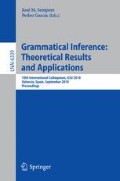Abstract
A class \(\mathcal{L}\) is called mitotic if it admits a splitting \(\mathcal{L}_0,\mathcal{L}_1\) such that \(\mathcal{L},\mathcal{L}_0,\mathcal{L}_1\) are all equivalent with respect to a certain reducibility. Such a splitting might be called a symmetric splitting. In this paper we investigate the possibility of constructing a class which has a splitting and where any splitting of the class is a symmetric splitting. We call such a class a symmetric class. In particular we construct an incomplete symmetric BC-learnable class with respect to strong reducibility. We also introduce the notion of very strong reducibility and construct a complete symmetric BC-learnable class with respect to very strong reducibility. However, for EX-learnability, it is shown that there does not exist a symmetric class with respect to any weak, strong or very strong reducibility.
Access this chapter
Tax calculation will be finalised at checkout
Purchases are for personal use only
Preview
Unable to display preview. Download preview PDF.
References
Ambos-Spies, K.: P-mitotic sets. In: Bekic, H. (ed.) Programming Languages and their Definition. LNCS, vol. 177, pp. 1–23. Springer, Heidelberg (1984)
Angluin, D.: Inductive inference of formal languages from positive data. Information and Control 45, 117–135 (1980)
Bārzdiņš, J.: Two theorems on the limiting synthesis of functions. Theory of Algorithms and Programs 1(210), 82–88 (1974)
Blum, L., Blum, M.: Toward a mathematical theory of inductive inference. Information and Control 28(2), 125–155 (1975)
Freivalds, R., Kinber, E., Smith, C.: On the intrinsic complexity of learning. Information and Computation 123, 64–71 (1995)
Glaßer, C., Ogihara, M., Pavan, A., Selman, A., Zhang, L.: Autoreducibility, mitoticity and immunity. In: Jedrzejowicz, J., Szepietowski, A. (eds.) MFCS 2005. LNCS, vol. 3618, pp. 387–398. Springer, Heidelberg (2005)
Mark Gold, E.: Language identification in the limit. Information and Control 10, 447–474 (1967)
Jain, S., Kinber, E., Wiehagen, R.: Language learning from texts: degrees of intrinsic complexity and their characterizations. Journal of Computer and System Sciences 63, 305–354 (2001)
Jain, S., Sharma, A.: The intrinsic complexity of language identification. Journal of Computer and System Sciences 52, 393–402 (1996)
Jain, S., Sharma, A.: The Structure of Intrinsic Complexity of Learning. The Journal of Symbolic Logic 62, 1187–1201 (1997)
Jain, S., Stephan, F.: Mitotic classes in inductive inference. SIAM Journal on Computing 38, 1283–1299 (2008)
Ladner, R.: Mitotic recursively enumerable sets. The Journal of Symbolic Logic 38, 199–211 (1973)
Osherson, D.N., Stob, M., Weinstein, S.: Systems That Learn, An Introduction to Learning Theory for Cognitive and Computer Scientists. Bradford — The MIT Press, Cambridge (1986)
Osherson, D.N., Weinstein, S.: Criteria of language learning. Information and Control 52, 123–138 (1982)
Post, E.: Recursively enumerable sets of positive integers and their decision problems. Bulletin of the American Mathematical Society 50, 284–316 (1944)
Author information
Authors and Affiliations
Editor information
Editors and Affiliations
Rights and permissions
Copyright information
© 2010 Springer-Verlag Berlin Heidelberg
About this paper
Cite this paper
Li, H., Stephan, F. (2010). Splitting of Learnable Classes. In: Sempere, J.M., García, P. (eds) Grammatical Inference: Theoretical Results and Applications. ICGI 2010. Lecture Notes in Computer Science(), vol 6339. Springer, Berlin, Heidelberg. https://doi.org/10.1007/978-3-642-15488-1_10
Download citation
DOI: https://doi.org/10.1007/978-3-642-15488-1_10
Publisher Name: Springer, Berlin, Heidelberg
Print ISBN: 978-3-642-15487-4
Online ISBN: 978-3-642-15488-1
eBook Packages: Computer ScienceComputer Science (R0)

